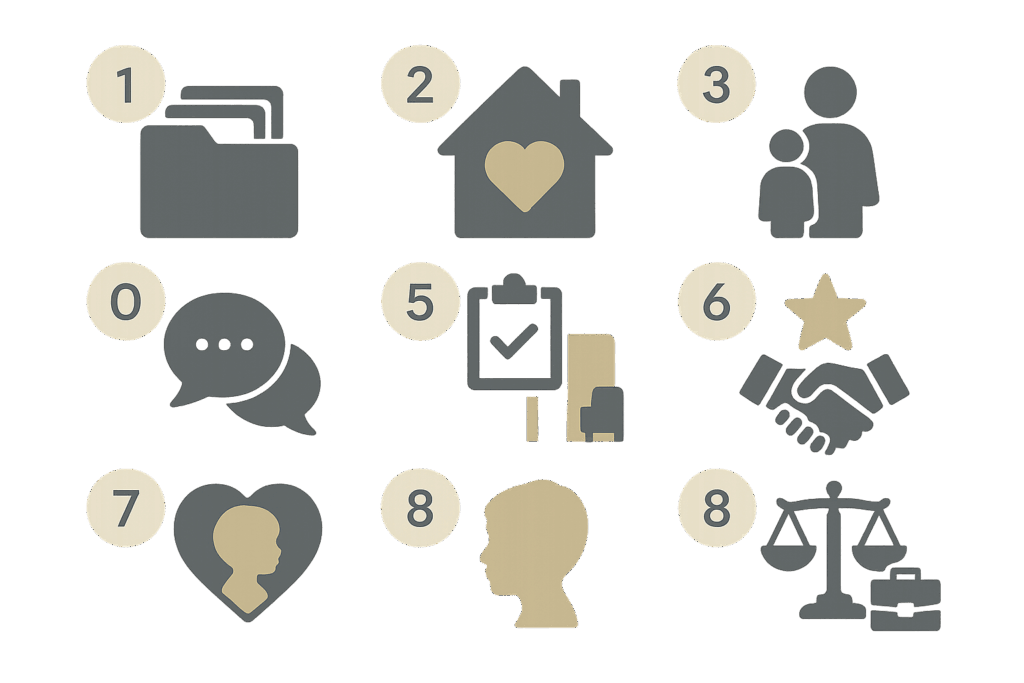Confidently Prepare for Your Child Custody Evaluation in Plano, TX
Facing a child custody evaluation can be overwhelming, but with the right preparation, you can approach this crucial process with confidence and clarity. The outcome of a custody evaluation can have a lasting impact on your child’s future and your parent-child relationship. At G.J. Chavez & Associates, P.C., we believe in empowering clients with practical strategies and compassionate legal support. Here are eight essential steps to help you shine during your child custody evaluation and secure the best possible outcome for your family.
Table of Contents

1. Understand the Purpose and Process of a Custody Evaluation
A child custody evaluation is an in-depth assessment conducted by a mental health professional or a court-appointed evaluator. The primary goal is to determine what custody arrangement serves the best interests of the child. The evaluator will observe each parent, interview the child, and gather information about the family dynamic, living conditions, and parenting skills.
Key Points:
- Evaluators are neutral and focus on the child’s well-being.
- The process may involve interviews, home visits, psychological testing, and gathering collateral information (school, medical, or counseling records).
- Be honest and transparent with the evaluator.
2. Organize and Present Relevant Documentation
Gather and organize documents that support your suitability as a parent. Good documentation demonstrates responsibility and preparedness.
What to Prepare:
- School and medical records for your child
- Proof of your involvement in extracurricular activities
- Communication logs with the other parent (texts, emails, co-parenting apps)
- Evidence of a safe, stable home environment (lease, mortgage, utility bills)
- Parenting plans or schedules
Organized paperwork not only supports your case but also helps the evaluator understand your role in your child’s life.
3. Maintain a Stable and Positive Home Environment
Your home is a direct reflection of your parenting. Ensure it is clean, safe, and suitable for your child’s needs.
Tips:
- Childproof the home as appropriate for your child’s age.
- Provide a designated sleeping area, study space, and play area.
- Keep routines consistent—bedtimes, meals, and homework times.
- Display family photos, artwork, and evidence of your child’s activities.
A welcoming, child-friendly home sends a powerful message to the evaluator about your commitment to your child’s well-being.
4. Demonstrate Positive Parenting and Communication Skills
Evaluators observe how you interact with your child and the other parent. They value parents who foster healthy communication and put the child’s needs first.
Best Practices:
- Remain patient and calm, even if the situation is stressful.
- Encourage your child’s relationship with the other parent.
- Avoid negative talk about the other parent in front of your child.
- Use respectful, cooperative communication with your ex-partner.
Show that you are focused on your child’s emotional health and are willing to cooperate for their benefit.
5. Prepare for Interviews and Home Visits
The evaluator will likely schedule interviews with both parents and the child, as well as home visits. Preparation is key.
How to Get Ready:
- Dress neatly and act respectfully.
- Rehearse answers to common questions about your child’s daily routines, needs, and preferences.
- Be honest about challenges but emphasize your efforts to address them.
- Have your child’s favorite toys, books, or activities available during the home visit.
Remember, evaluators are not looking for perfection—they want to see genuine effort and care.
6. Gather Character References
Letters or statements from individuals who have observed your parenting can significantly strengthen your case.
Who to Ask:
- Teachers, coaches, doctors, or counselors
- Friends, neighbors, or family members with firsthand knowledge of your parenting
- Childcare providers
References should focus on your parenting strengths, involvement, and commitment to your child’s welfare.
7. Prioritize Your Child’s Emotional Well-Being
Put your child’s emotional needs at the center of everything you do during this process.
Do’s:
- Listen to your child’s concerns and reassure them.
- Avoid discussing legal matters or the evaluation with your child.
- Support your child’s relationship with the other parent.
- Maintain stability and routine to reduce stress.
Evaluators prioritize the emotional health and stability of the child above all else.
8. Consult with a Knowledgeable Plano Custody Attorney
Legal guidance is invaluable during a custody evaluation. An experienced attorney, like those at G.J. Chavez & Associates, P.C., can help you:
- Understand the evaluation process and what to expect
- Present your case effectively
- Address concerns or disputes proactively
- Advocate for your interests in court if needed
Having a skilled legal team in your corner can make all the difference in your custody case.
Frequently Asked Questions About Child Custody Evaluations in Plano, TX
Q: How long does a custody evaluation take?
A: Evaluations typically take several weeks to a few months, depending on the case’s complexity and the evaluator’s schedule.
Q: What if I disagree with the evaluator’s findings?
A: You can contest the findings in court or request a second evaluation, but you’ll need valid reasons and supporting evidence.
Q: How can I help my child during the evaluation?
A: Provide reassurance, maintain routines, and avoid discussing the case’s details with your child.
Q: Will the evaluator talk to my child alone?
A: Yes, evaluators often interview children privately to understand their feelings and perspectives.
Moving Forward with Confidence
A child custody evaluation is a pivotal moment in your family law journey. By following these eight proven steps, you can present the best version of yourself as a parent and support your child’s well-being during a challenging time. Remember, G.J. Chavez & Associates, P.C. is here to guide you through every stage of the custody process in Plano, TX, ensuring your rights and your child’s best interests are protected.
For personalized support or to schedule a consultation, contact G.J. Chavez & Associates, P.C..






